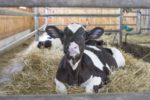Items Tagged with 'vaccine storage'
ARTICLES
Smaller producers often simply accept as fact that their production costs are going to be higher than their larger counterparts. However, there are myriad ways for any herd to become more cost-effective and profitable.
Read More
Cattle vaccinations: Worth a shot
Proper vaccination is crucial for animal health, but methods matter. Producers should differentiate between modified-live and killed vaccines, store them properly and remain aware of possible adverse reactions.
Read More
Train your team for effective intranasal vaccination
While prevention is key, successful intranasal vaccination is essential for protecting calves from BRD. Proper storage, handling, administration and record keeping are essential for an effective vaccination program.
Read More
Vaccine handling: It’s more important than you think
The following information will help you give the right vaccine to the right animal at the right dose, allowing the vaccine to work as intended. Giving mishandled vaccines to your cattle will not provide the disease protection you expect.
Read More
Vaccine-adverse reactions: How to minimize the lumps and bumps
Vaccinations are meant to help prevent and treat disease. However, adverse reactions can range in severity from mild temporary lumps and bumps to sudden systemic anaphylactic shock with fluid accumulation in the lungs and death.
Read More
Killed vs. modified-live vaccines: Which type is right for your operation?
Vaccines are an essential part of many herd health programs. Understanding the key differences between vaccine types can help you create a safe and effective vaccination program that matches the disease exposure risk for cattle on your operation.
Read More
Is there a future for mRNA vaccines in commercial cattle production?
MRNA vaccines, although not yet approved for use in cattle, have generated interest and debate within the beef industry. Experts cite the potential benefits of such vaccines and the challenges that lie ahead.
Read More
What causes vaccines to fail?
Vaccines can fail for a multitude of reasons, but whatever the reason, it is something no producer wants to deal with. Producers can take simple steps to help limit vaccine failures and have solutions in place if they need them.
Read More








